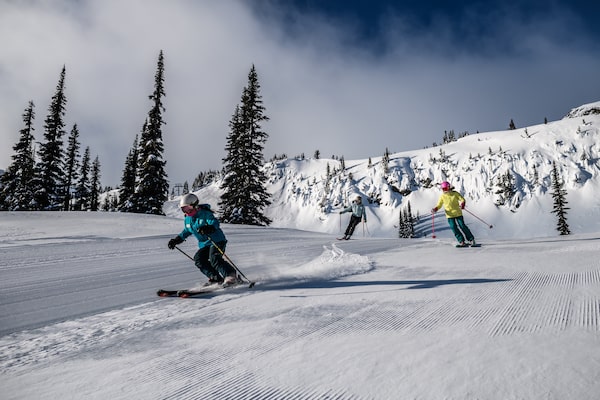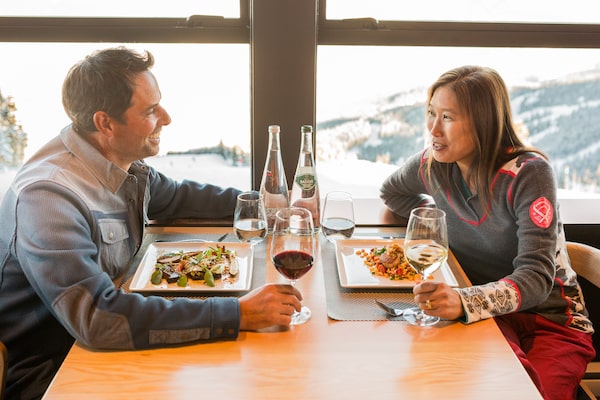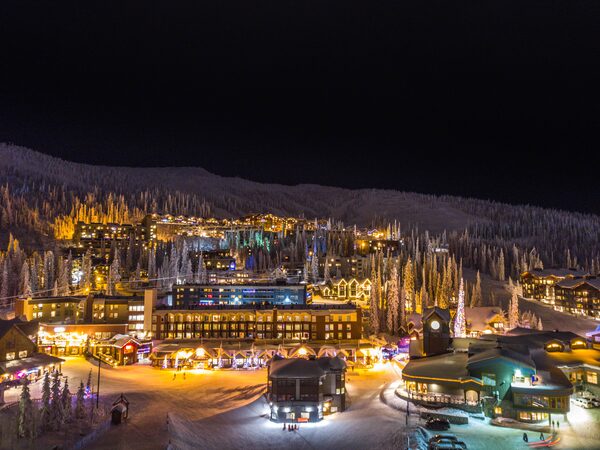
Whistler Blackcomb in B.C., along with all Vail Resorts, will be implementing a reservation system that prioritizes pass holders.Andrew Strain/Supplied
For Canadians looking for an activity this winter that will get them out of the house, skiing has two big safety merits: It takes place outdoors and it’s usually easy to stay distanced from others. But there are occasions, such as taking a lift or getting lunch, when it’s more difficult, and this has required resorts to make changes.
The experience at mountains across the country will be different on opening day this year. Many of the new protocols are similar to those at retail and grocery stores – skiers will have to wear a mask and stay at least two metres apart from others – and the process for everything from renting equipment to taking a rest will change.
“It is not going to be what you are used to," says Marc Riddell, spokesperson for Vail Resorts, which owns Whistler Blackcomb. "We need to get this resort open and we need to stay open for the duration of the season. … The only way we are going to be able to do that is to get folks to understand what we are trying to accomplish. I don’t think that is a hard sell.”
In Alberta, Pete Woods, president of SkiBig3, the joint venture between Banff Sunshine, Lake Louise and Mt. Norquay, echoes that message. “The focus of the resorts right now is doing everything they possibly can to open and stay open this winter,” he says. “I would not say anything has been easy for us this year.”
Here is what to expect.
Buying a pass/ticket
For the most part, windows at kiosks to purchase same-day tickets will be closed. At some mountains, skiers will be able to pick up prepurchased day tickets at the window or at guest services. Mountains are trying to reduce the number of contact points and are encouraging skiers to purchase passes, even if it is only for a few days, and to do so ahead of arrival. In Alberta, SkiBig3′s Lake Louise Ski Resort, Banff Sunshine and Mt. Norquay will have ticket windows open, but will also deliver tickets to hotels.
Whistler Blackcomb in B.C., along with all Vail Resorts, will be implementing a reservation system that prioritizes pass holders. Le Massif de Charlevoix in Quebec will restrict the number of guests on the mountain and only sell a limited number of day tickets in advance. Mont-Tremblant in Quebec and Blue Mountain in Ontario will also prioritize pass-holder access with limited advance daily lift tickets available. Mont-Tremblant is discontinuing the sale of undated tickets, including those sold at Costco.
Many resorts have adjusted cancellation policies and will be offering rebates or refunds for season pass holders if the mountain closes again. Revelstoke Mountain Resort in B.C. will continue to honour its “no questions asked” refund policies while the SkiBig3 mountains all offer free itinerary changes and cancellations up to three days prior to arrival.
Renting equipment
Capacity inside rental locations will be reduced, masks must be worn and all the equipment will be sanitized in between users. Some resorts will require a reservation, and the ones that don’t will encourage skiers to purchase rentals online prior to arriving. Big White has a new laser foot-measuring system to reduce touch points. At Le Massif, you can still rent on site, but now also online, picking up the equipment at an outdoor kiosk.
“The creativity is really around trying to use more electronic approaches to get people processed and on the mountain quicker,” says Woods of SkiBig3. “Historically you wouldn’t have, for rentals for example, a reservation system that spaced people out, you would just show up. … I think some of this registration and scheduling is probably going to stick.”
Lessons
Group sizes will be reduced and, at some places, such as Whistler, lessons, usually offered to groups of six, will be capped at three or four. Big White is limiting the number to five; everyone must be in the same bubble and the lesson will be booked privately. Instructors and students will have to wear masks and complete a health screening prior to arriving at the mountain.
For many places, regular multiweek lessons will take place, but with a few changes. At Dagmar in Ontario, for instance, parents are encouraged to get their kids ready at the car and go straight to the lesson meeting point without going in the chalet; guests will not be able to leave any personal belongings in the chalet. Mont-Tremblant has also stated that all personal effects must remain in your car.

Food options will be reduced with many resorts planning prepackaged grab-and-go items.Paul Morrison/Supplied
Taking the lift
Many resorts are suggesting guests get ready at the car and walk straight to the lift. Masks or face coverings (neck warmers or buffs that cover your mouth and nose are acceptable) will be required while waiting in line and riding the lift, and lift lines will be longer and wider to allow people to stand farther apart while waiting. Other changes: Fewer people will ride each lift unless they are in the same bubble, gondola windows will remain open and skiers are recommended to refrain from touching any surfaces. Also on gondolas, some mountains will be encouraging skiers to load their own equipment.
Lunch
Food options will be reduced with many resorts planning prepackaged grab-and-go items. As indoor chalets will operate at reduced capacity with tables spread farther apart, resorts will set up outdoor tents to increase seating. They may also have food trucks and outdoor barbecues. Masks are required inside except when eating. Resorts are encouraging everyone to eat outside of regular lunch hours to avoid the peak lunch rush, or return to a residence if possible and to pack snacks and water to eat and drink on the hill. Mont-Tremblant adds that, if it is operating in the red zone, food services will be closed and the chalets will only be open for guests needing to warm up.
Après
“This winter, more than ever, it is important to think through your plan, what you want to do, where you want to eat,” says Lauren Everest with Tourism Whistler. She suggests making reservations for most dinners well in advance. Resorts are planning to open most restaurants though at reduced capacity, and masks will be required, except when eating.
But don’t expect much in the way of activity options off the hills. “Our goal is to keep everyone outside during daylight hours and return to the safety of their own homes in the city of Kelowna and/or to their on-mountain residence or rental accommodation,” says Michael Ballingall, senior vice-president of Big White Ski Resort. “For this reason, we have closed night skiing, our tubing park and the outdoor skating rink.” Concerts and parties are cancelled.
As much as this ski season will be unlike any other, the one area where there will be no change is in the skiing itself. After we put on our masks, wait in a physically distanced line and ride up a lift with our bubble, we will get to the top and point our skis down. At that moment as the air rushes past and our skis glide over fresh snow, it may seem just like any other ski day.
“Skiing is still skiing, riding is still riding. That’s not going to change,” Riddell says. “I think, more than ever, people need that.”

'Our goal is to keep everyone outside during daylight hours and return to the safety of their own homes in the city of Kelowna and/or to their on-mountain residence or rental accommodation,' says Michael Ballingall, senior vice-president of Big White Ski Resort.Supplied
New this year
Alberta Lake Louise will open 480 new acres of terrain with the West Bowl plus a new lift to access it. The ungroomed terrain promises intermediate to advanced skiers steeps, powder bowls and glades. The resort will also have a new four-person chair that will replace the Poma lift, taking skiers to the top of Whitehorn Mountain.
Sunshine Village has installed high-speed fibre-optic cable up the mountain and throughout the village for visitors who are “working” remotely.
British Columbia At Revelstoke, a fixed-grip quad installed last season connects skiers with six runs and 426 feet of vertical.
Near downtown and about a 15-minute drive from the mountain, Basecamp Revelstoke will open this fall. Overlooking the Columbia River, this boutique hotel has an automated check-in system and guests access units through exterior doors, which limits contact with others.
RED Mountain introduced ecofriendly cabins where visitors will have direct access to the chairlift.
Keep up to date with the weekly Sightseer newsletter. Sign up today.